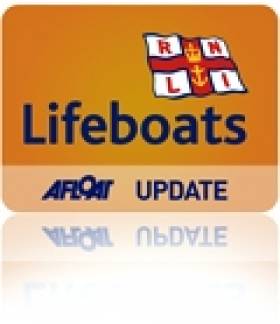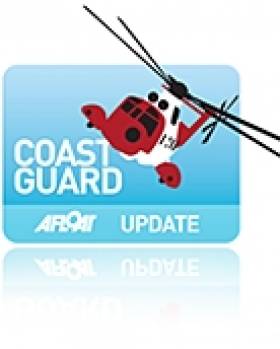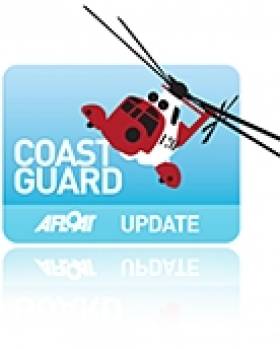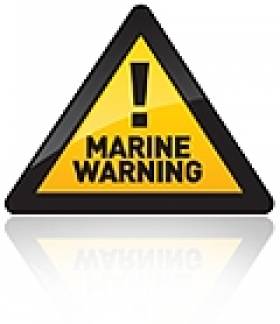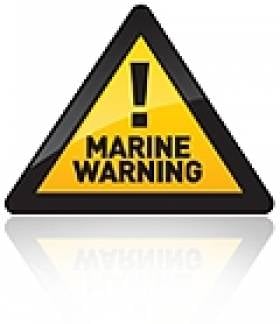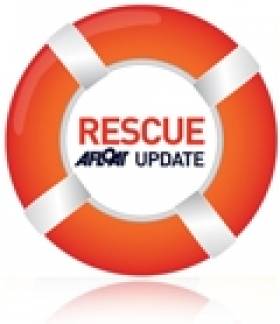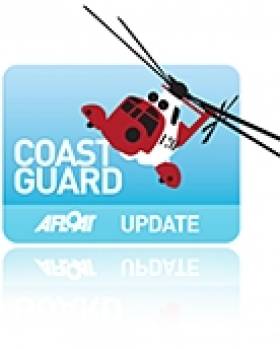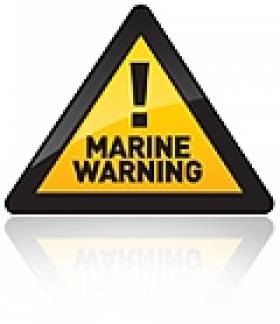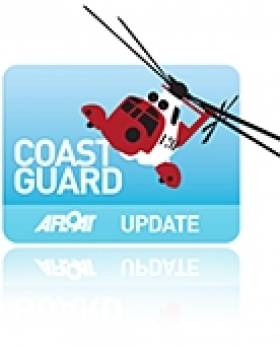Displaying items by tag: Cliff
Koda The Husky Rescued By Quick-Thinking RNLI Crew
#RNLI - Two volunteer crew members from Kinsale RNLI came to the rescue of a husky dog who had a dramatic fall off a cliff near the Co Cork village recently.
Koda, a pedigree husky, was inspecting the coastline around Sandycove when she got too close to the edge and slipped over the 30ft cliff.
The dog landed in water with a strong current that swept her out to sea despite her desperate struggles to reach the shore. She managed to get herself back on a ledge by which time the alarm was raised and volunteer lifeboat crew were on their way.
A jagged reef also meant that Kinsale RNLI’s inshore lifeboat couldn't get close enough to help drag the struggling dog from the water.
However, Kinsale RNLI volunteers Nick Searls and Ian Fitzgerald were at the scene within minutes, and realised the danger facing the terrified dog.
Searles dived into the sea and swam over 60 metres to reach the animal. He managed to attach a harness and was able to swim slowly back to shore, dragging the weakened Koda with him. He was then assisted by safety line out of the sea by Fitzgerald.
Koda was immediately taken to a Kinsale vet, who confirmed that despite being exhausted and shocked by her ordeal, the dog was none the worse for wear.
In other news, Donaghadee RNLI assisted two men on board a yacht which got into difficulty off the Co Down coast yesterday morning (Tuesday 7 May).
The volunteer lifeboat crew was requested to launch at 9.50am by Bangor Coastguard to go to the aid of a yacht which had ran aground.
The 30ft yacht with two people on board had gone aground on rocks at the entrance to Donaghadee Marina.
With the help of another vessel, the lifeboat crew was quickly able to get a tow line to the yacht and pull it off the rocks.
The yacht, which had sustained some damage to its rudder, was able to make its way safely into the marina.
Angler Rescued after Fall from Cliff
At just after 1pm Liverpool Coastguard received a 999 call from a member of the public who had witnessed the person fall in to the sea from cliffs adjacent to the historic St. Ninians Chapel. They immediately sent the Coastguard Rescue Team from the Isle of Whithorn, the Royal Navy rescue helicopter from Prestwick and the RNLI Lifeboat from Kirkcudbright.
As the Whithorn Coastguard team arrived on scene, members of the public were just bringing the person ashore. He is believed to have sustained a broken leg and head injuries in the fall. He was winched on board the helicopter and taken to Crosshouse Hospital near Kilmarnock.
Tony Topping Liverpool Coastguard Watch Manager said:
"We're not really sure how the angler ended up falling from a ledge in to the sea but cliff edges are dangerous places and we would ask people to take particular care.
"If you are walking along coastal paths make sure that you are properly equipped. In particular remember to wear sturdy shoes or boots and check the weather forecast before you set out. Do not attempt to climb up or down cliffs unless you are properly equipped and trained to do so. Do not attempt to climb cliffs as a short cut back to the top. Do not attempt self rescue. If you get into difficulty, call 999 and ask for the coastguard.
70 Year Old Man Falls Over Cliff
Milford Haven Maritime Rescue Coordination Centre was alerted at just before six o'clock by a member of the public who was with the man when he fell. They immediately sent Coastguard Rescue teams from Gwbert and New Quay, the RNLI Lifeboat from New Quay and the RAF rescue helicopter from Chivenor to the scene.
On arrival they found that the man was very close to the incoming tide so he was lifted into the lifeboat and winched from there to the helicopter. He was then taken to hospital in Haverfordwest.
It's believed that the man had been out fishing and was walking to his car when he slipped five metres to the base of the cliff. He suffered serious head injuries.
Mike Rogers Milford Haven Coastguard Watch Manager said:
"This was a complicated rescue because the tide was rapidly coming in. I'd like to thank the member of the public, that reported the incident, for his assistance and the teams for their rapid response to this unfortunate accident.
Coast Guard Advises Caution in Severe Weather
The Irish Coast Guard has advised members of the public to take care in the current severe weather conditions, particularly around the coast and in exposed areas.
Sea Activities
Avoid sea or water-based activities today if possible.
Cliff Walking
There is safety in numbers. Always let someone know when and where you are going, and when you are expected to return. Stay well away from cliff edges, both top and bottom. Don't attempt to rescue people or pets if they fell over a cliff edge. If assistance is needed dial 999 or 112 and ask for the Coast Guard.
Coast Guard Issues Advice for the August Bank Holiday
The following are general safety tips and advice to help enjoy the water and coastal activities in your area this weekend.
Swimming
Only swim at beaches and waterways that have Lifeguards on duty and pay attention to the safety flags. Ask the Lifeguard for advice about safety and water conditions and adhere to their instructions. Avoid using inflatable toys, such as lilos and rubber rings, on the water.
Cliff Walking
There is safety in numbers never be alone if possible. Let somebody know when & where you are going and what time you will be back . Stay well away from the cliff edge, both top and bottom. Don't attempt to rescue people or pets if they fall over the edge. If assistance is required dial 112 and ask for Coast Guard.
Water Sports and Coastal Activities
Before going to sea check local weather conditions and tides in the area. Wear correctly maintained and fitting lifejackets that are suitable for the activity. Lifejackets are of no use unless they are worn. Ensure your craft is fit for purpose.
Do not overload the craft. If you are in difficulty or see someone in difficulty and requiring assistance dial 999/112 and ask for Coast Guard.
Swim, walk, boat, surf, sail, canoe and enjoy our cliffs, beaches, seas, and waterways this weekend - but do it safely.
Kinsale Coast Guard in Daring Cliff Rescue
The Irish Coast Guard's Kinsale unit was involved in the dramatic rescue of a man clinging to the sheer side of a cliff on Sunday.
TheJournal.ie reports that the man, a 20-something English tourist, had been caught on the beach below at high tide and tried to climb the cliff face to escape, but got into difficulty half-way up.
The man was spotted by a couple walking the clifftop near Garrettstown Beach, who alerted the Old Head of Kinsale coastguard unit.
A cliff rescue expert abseiled down to attach a lifeline and harness, and the man was lifted to safety. He was treated at the scene for cuts and bruises.
Unit officer in charge Eddie Butler told the Irish Examiner that the man didn’t know how he had held on as long he did.
"When we arrived and saw the situation, I didn’t think we’d save him. I think we got to him just in time," said Butler. "The water was raging beneath him. If he had lost his grip and fell in, he would have been lost."
Elsewhere, six people were rescued from a sinking cruiser in the River Shannon on Sunday afternoon following its collision with a bridge in Killaloe, Co Clare.
According to The Irish Times, two members of the Irish Coast Guard's Killaloe unit arrived quickly on scene two help the six occupants and their dog to safety on the riverside.
The Killaloe unit reports that the cruiser was subsequently run aground in the shallows at Ballyvalley to prevent its sinking.
Howth Coastguard and Lifeboat Rescue Teenager
The teenager had walked down a 100 foot steep cliff path to Jameson Beach on Howth Head with her friends when she collapsed. Gardai arrived on the scene and requested Coast Guard assistance to 'extract the female'.
The Howth Coast Guard Cliff Rescue Team were paged and arrived quickly at the scene. Medical care was given by the team, the casualty who was suffering from the cold was stabilised and placed in a stretcher for evacuation. Due to the terrain the quickest way to extract the casualty was via boat. Howth lifeboat quickly responded and the casualty was transferred back to the lifeboat station to a waiting ambulance.
The Coast Guard remind people that if they see someone who needs help on a beach to phone the new European wide emergency phone number, 112, and ask for the Coast Guard.
Stay Away from the Edge Warns Irish Water Safety
Irish Water Safety is asking people to keep away from the water's edge during the current violent storm force winds and high seas. Ireland averages 153 drownings every year and every year a number of tragedies occur as a result of people walking too close to the edge of coastal areas, cliffs, rivers and lakes during such stormy conditions.
Irish Water Safety is also asking those who own a small craft to make sure that it is well secured and when doing so, to wear a lifejacket at all times as there have been drownings during such activities in the past.
Motorists need to be particularly vigilant to avoid flooded areas on roads but particularly near rivers, because with poor light and short days it is not possible to determine the depth of floods easily. Swift water will carry cars and other vehicles away and there have been very tragic drownings in the past as a result of such accidents.
Children are naturally curious about water, therefore parents should caution them that floodwater hides the true depth and that manhole covers may be open and that small streams when swollen are very fast and deeper than normal.
What should I do when I hear a Flood Warning?
· Listen to the national and local radio for met eireann updates and AA Road watch updates
· Check on neighbours particularly if they are elderly, infirmed or families with young children
· Move your vehicles to higher ground
· Move animal stock to higher ground
· Check your small craft to ensure they are well secured or moored
· Make sure you have warm clothes, food, drink, a torch and radio.
· Block doorways and airbricks with sandbags or plastic bags filled with earth. Floodgate products will work effectively also.
· Switch off gas and electricity supplies if flooding is imminent.
· Check the time of High Water in the Newspaper.
· Check out www.flooding.ie for more detail on General flooding
Personal Safety
· Avoid flood waters at all times
· carry a mobile phone at all times in case you need to call for help - call 112 or 999 in emergency
· Wear suitable protective clothing & a lifejacket in on or around water
· Do not enter fast flowing water.
· Never put your feet down if swept away by fast flowing waters
· Flooding on roads will be deeper at dips and around bridges.
· Stay away from sea and flood defences.
· when walking or driving, be aware of manhole covers and gratings that may have been moved due to the heavy flow of water.
· Take care when using electric appliances in damp or flood conditions.
· Remember that during the hours of darkness the dangers are multiplied.
After the flood
· Avoid eating food that has been in contact with flood water.
· Run water for a few minutes and wash your taps.
· Check gas and electricity supply.
· Leave wet electrical equipment alone to dry and have it checked prior to use.
· Ventilate your property well.
· Check on elderly neighbours.
Helicopter Rescues Man Who Fell off Howth Head
A man who was critically injured when he fell 100ft off a cliff in Howth has been rescued by the Coastguard helicopter.
At 17.30 this evening Howth Coast Guard were requested by Gardai to assist with the search for a male last seen at Howth Summit car park. The unit's Volunteers assembled and began searching the cliffs along Howth Head, according to the Howth Coastguard website.
The Coast Guard Helicopter, Rescue 116, was also requested, according to Howth Coastguard.
Shortly before 18:00 one of the Coast Guard search teams sighted a male who appeared to have fallen 100 feet off the cliff path near the Bailey Lighthouse. The Coast Guard Cliff Rescue Team were deployed to set up a rope rescue and lower two Cliff Rescue Climbers; meanwhile Rescue 116 proceeded to lower a Paramedic winchman to the casualty. The three rescuers administered first aid while the helicopter prepared to lift the casualty. They were joined by personnel from the Howth RNLI inshore lifeboat.
The casualty was extracted frrom the cliffs and transferred by the Coast Guard helicopter to Tallaght hospital.



























